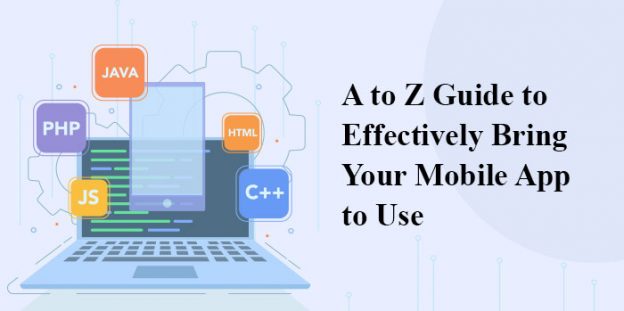A to Z Guide to Effectively Bring Your Mobile App to Use

Businesses are nowadays counting on mobile app development hugely due to a great influence of mobile phones in our routine activities. From an ordinary communication device to assisting us for an immense range of pursuits, mobile apps have definitely come a long way. High speed internet and the ever-evolving technologies have been a great support at the same time. Here’s a complete guide on what it takes to develop a mobile presence and bring it to real usage.
What is mobile app development?
Mobile app development is a set of activities performed to create software application that can run on mobile devices utilizing a network connection. The major activities involved in mobile app development comprises of creating installable software bundles majorly code, binaries, etc., implementing backend services, for example, data access with an API, and testing the application on target devices.
How to get one developed & bring it to use?
Planning: The creation of a mobile app starts with a fool proof planning containing some of the crucial decisions on domain, features, scope, technologies, target market and a lot of other things depending upon complexity of the solution you are coming up with. Firstly, you need to have an app idea in order to jump over planning. A great imagination backed with enough research and understanding of target audience turns out to be a great app.
Feature list creation: Once you have a great idea in your mind, ponder over the features to be included. Make different lists for core features and good to have ones. If you have budget or timeline restrictions attached with the project, then you can come up with an MVP initially and later extend in further phases. Some of the common features of an app including registration, login, personalized dashboard, analytics, splash screen, navigation, social feeds, product menus, loyalty cards etc. Understanding the main purpose of the app and demands of the market would help you a lot in narrowing down the feature list.
For example, there is a hotel operating in Nob Hill which receives a high number of booking requests due to which it has become difficult to handle request, provide a great booking experience, tracking guest data etc. So, the owner decided to have an app in place that is capable to receive requests, allow online booking, cancellation and a lot of other things. Coming back to the point, along with the features, you have to also define the flow of your application so that the UI designer and developers can understand where to put what.
Technology choice: Since we are blessed with a lot of technologies now having their own advantages and disadvantages, we have to pick or a combination compatible to work with each other. In the case of mobile apps, you can either go for Native apps or Hybrid apps. A native application is a software program that is developed to use on a particular platform or device. If you want to get an Android as well an iOS app developed, they have to be coded separately. The native iOS apps are written either in Objective C or Swift whereas if we talk about Native Android apps, they are written in Kotlin and Java. Native applications generally have a responsive interface and things are loaded faster as compared to any other type of applications. Native apps take full advantage of the particular platform for which it is developed and is said to offer great user experience. Native applications come up an advantage of optimized performance plus you can use the device features such as Camera, GPS etc.
Other one is Hybrid applications. Hybrid applications are developed using cross platform frameworks like Xamarin, PhoneGap, Ionic and more. Hybrid apps get developed in a short span of time as you have to write code just once and the same is used across all the platforms. If you want to quickly launch your mobile app for some purpose, then hybrid is a great option for you to stand out of the competitors. If you go for Native, you might have to hire costly resources and that too separate resources for different platforms. Though, the development time also depends upon the features required.
Wireframing: A wireframe is a visual guide that represents the skeletal framework of a mobile app. In simpler words, wireframes are rough designs through which you fix the placement of elements on various screens and link them with each other as per the flow of your app. Wireframing is generally done before the real designing starts so that no rework happens in future. If your designer knows the placement and linking, he/she will be able to put his complete efforts and level creativity on the designing part. There is a number of tools available online in order to help you with wireframing. You can create a simple sketch in black and white format or even go for a fully-fledged design with colours, typography choices and all. When you create an app wireframe, your main goal is to ensure the pain-point of your users is solved and also map out a great UX for them.
Wireframes help you a lot in avoiding future mistakes that your designer or developer might commit. It helps you decide which features to take prominent places, which screens they should go on, would things become messy and a lot other things.
Adobe Xd, UX Pin, Fluid UI etc. are some of the widely used tools which help you create wireframes, sitemaps, storyboards, flowcharts and many things supporting future development. These tools also come up with a huge library containing useful elements that can be easily dragged and dropped for use.
These tools also allow you to include animations, video and object states that can be used to create an interactive PDF which is equal to a wireframe for your website or app. When wireframing is done before designing, you can protect your project from an unnecessary elongated timeline.
Hire a mobile app developer: If you are not a coder, you need to hire a mobile app development company or an individual developer in order to get your application developed. If you go for a company, you will get all the solutions one roof whereas going for a freelancer increases a lot of your work. Mobile application development is not a single task but a club of activities. It includes designing, testing and other associated things as well which cannot be solely done by a developer. If you go for a single developer, you will have to search for different resources and then making them work together is altogether a new task. Whether you go for a company or an individual developer, you need to analyse a few things like portfolio, experience and professionalism. An app development company should ensure timely delivery of the project. Once you handover them the feature list, they will be able to provide you with a timeline and cost.
A good development company or developer should be able to not only guide you through the process but also provide you the required creative input based on their experience with similar apps.
Meanwhile, pre-launch marketing: While your application is getting ready to hit the market, you need to start pre-launch marketing to let people know that you are coming up with a solution that might be useful for them. Why is pre-launch app marketing important? According to Statista report which contains data on the number of apps available for download in leading app stores as of the second quarter of 2019, “As of that period, Android users were able to choose between 2.46 million apps. Apple’s App Store remained the second-largest app store with almost 1.96 million available apps.” Now that people have millions of options to choose from, you have to make real efforts in grabbing the market.
First step is to research your competitors and analyse their strategies. An effective pre-launch marketing plan starts with a good research on target and the competition. Look at your competitor’s strategies and see what works most in dealing with this kind of audience. You will get to know how users interact with such kind of services. By a thorough research, you will b able to position yourself against their selling points as well as weak points. Reaching out to friends, family and professional circle has become a bygone technique for marketing. You now have social media platforms and with their immense potential, you can easily reach out many. Though, with much of advertisement applications, social media platforms have not kept the advertisement cost on lower side. You have to spend a good amount on marketing in order to reach a good number. Though, spending is not enough, social media starves for a good targeting in order to produce results. Hence, it becomes important to understand the aspects related to target audience.
Creating a landing page should be your next step. If you are promoting your app by means of any tactics, be it social media, emailing or any other, you have to make people land somewhere. You can land them over a page where you have mentioned the basic idea of your app and the solution you are coming up with. You can put a timer over there to let people know the launch date. Take their emails and basic details here to make them early subscribers. Offer them some rewards to be early subscribers.
You can also create a blog for your app. Blogging would help you update your fan base and at the same time, attract new users. Each post should represent and solidify your brand voice. Try to speak about relevant issues existing in the market surrounding the app. Also conduce a research on keywords with the help of Google Keyword Planner which helps you maximize your SEO rankings and write what’s in demand.
When you are able to collect enough of the email addresses, you can carry out email marketing. Run campaigns and come up with the information that turn out to be useful for the users.
You can also go on creating a press kit by approaching journalists and influencers. Press releases are the great source of traction these days which brings real traffic on your website or app. You can also consider approaching micro influencers who keep ability to influence the purchasing decisions of modern buyers. An influencer is a person who is popular/well-known in your market. They can be a social media or blog owner, or even a celebrity who is actively followed on social platforms. If you approach a niche influencer, you can make their followers your customers. Influencer marketing is effective these days as people prefer to follow real people, more precisely real users rather than celebrities.
Timely feedbacks: While you are running your campaigns, you need to also keep track on the progress of your project. As most of the companies nowadays adopt Agile methodology, you need to provide them timely feedback to get timely deliveries. If your developer has updated, you today then make sure you take a day or a couple of days to come up with a green tick or concerns. If you go on checking it after 10 days, then there would be a lot of rework. Also, your developer might get annoyed or even deny making the changes resulting in unnecessary disputes.
Feedbacks are not just associated with development, in fact they are majorly about designing process. Even if you were ready with wireframing, you will have concerns with the first shot by the designer. It is important to provide timely feedbacks so that your developer can proceed quickly. The companies have project managers employed with them who coordinate things between developers and client. Slight changes are generally considered by the companies if you are working on good terms but yes, major changes would bring a significant variation in timeline and cost
Publish your app: Once the development is over, you need to publish your app on app stores which means Play store in the case of Android apps and iOS Appstore in the case of iOS applications. Publishing works differently on different app marketplaces.
To publish your app on Playstore, you need to keep some things ready with you as we have told you in one of our past blogs. Here, we are posting them again,
There are some things that Android App Developers need to keep ready in their carts before following the steps to publish any application over Play Store. These things would help you present your application in front of prospects in a good manner.
1. Google Play Publisher Account: In order to publish any app, you need to have a publisher account on Google Play. This account would let you publish and handle all the information regarding your app in future.
2. Signed APK: If you app has been completed and it’s time for launch then you need to generate signed APK in Android studio as Android requires it.
3. App icon: App icon is basically the logo of your app that users see on their app listing interface. It should be uploaded as 512 x 512 32-bit format which is saved as PNG as any other format is not supported.
4. Feature Graphic: The size has to be 1024 x 500 JPEG or 24-bit PNG with no alpha.
5. Keep both short and long description ready for your app. It should explain your application and its functionalities in brief.
Next up, you have to create a Google developer account and then a merchant account. You need to then create your app over that account, means you have to give title, choose language and stuff. Once you create the account, you need to prepare store listing and enter the product details. Graphics assets are required to be added then along with logo of your app and the necessary screenshots. You have to also look at the language and translations. Put your app in the most apt category so that when people search, you can be visible. Enter contact details to complete the next step. Update privacy policies now. Your privacy policies should explain about the access permissions it requires from the user’s end. You need to keep your users updated of how that information is being used. Also, it is compulsory to attach a URL i.e. Link of your business privacy policy to your app so as to ensure that it is working perfectly fine. Next up, the uploading of your APK is required in which you just have to select the app that you had created in the third step and locate Release Management and App Releases. Provide content rating, pricing details and publish your app right away.
Passing your app on Apple’s app store is relatively tough than Android because there is rigorous check performed at the platform due to which your app might get rejected and all your efforts might go in vain.
To submit your app to the App store, you need to first have register yourself to Apple developer program. The registration is not free. To keep your app on App store, you have to pay a subscription cost of $99 every year. Create an iTunes connect account so that your app can be managed in a good way. Provide information related to your app such as metadata, screenshots, icon etc. Your iOS app should have a detailed description with all the required metadata. The metadata should include the following:
1. The name of your app
2. The version number
3. The category for your app
4. A detailed description
5. Any additional keywords
Completing other formalities, you can now upload a build of your app using platforms like Xcode or application loader. Submit your app for review. Once it gets a green tick, either I gets automatically released or you have to manually go on the portal and release it based on your selection at the time of upload. Apple gives you two options. You can go for manual as well as automatic release.
Post launch marketing: Once your app is out for public use, you cannot just sit and wait for users to install it. You have to make marketing efforts to stand out of the crowd of competitors.
With your pre-launch efforts, by now, you must have receive a good social media following. Continue to grow an audience by engaging with them to establish loyalty. You can also include Burst marketing in your strategies in order to get a quick exposure. Burst marketing is defined as purchasing a lot of paid media exposure in a time period of 24-72 hours. The purpose is to get as many users as you can in a short span of time.
If your goal is keep attaining a good rank on app stores, do not stop the marketing even after the burst marketing ends. You need to remember that the more installs an app gets in a short period of time the more it is preferred by app stores for higher ranks.
Another way is to offer referral bonus to the users. Offering your users, a bonus when they promote your app online is a sure-fire tip to get them to spread in the word.
Indulge yourself in App store optimization so that you can attain high ranks on app stores organically.
Ask for reviews as modern buyers prefer relying on them greatly.
Keep the number growing by regular interaction with the market and its requirements.
Do not over promise things but yes keep in mind to provide what you have promised.








